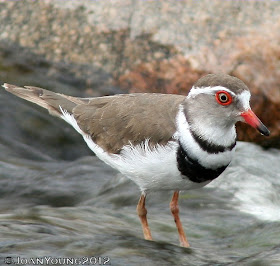Ever wonder how an elephant manages to carry around that massive head?
The truth is that the whole skull is made up of a honeycomb-like structure and not solid bone.Wednesday, February 27, 2013
Monday, February 25, 2013
Longhorn Beetle (Evgenlus plumatus)
Family Cerambycidae
A medium size and very colourful beetle.
No information is available on it either but I post these pictures for identification purposes.
Saturday, February 23, 2013
Ruff
A medium size bird found at inland estuaries and waters.
It breeds in Europe during our winters and migrates back in the summer.They forage both day and night on insects, molluscs, worms and berries.
Thursday, February 21, 2013
Common Night Adder
Family Viperidae
This has the longest venom glands of all our snakes –they may extend up to a third of the way down the body. Despite this, its venom is not considered deadly to humans.
They reach an average length of 1m. The females lays eggs which may take up to 85 days to hatch.
 It is found in the eastern regions of SA. They are found in gardens near water features where they hunt frogs.
It is found in the eastern regions of SA. They are found in gardens near water features where they hunt frogs.It is mostly active at night but comes out on cloudy days to find food.

Tuesday, February 19, 2013
Cicada emerging
Cicada females lay their eggs in the ground and it takes between 8-10 years for it to pupate. When they finally emerge, they crawl up a tree and then the cicada hatches but this is normally done at night and all that is left in the morning is the empty skin. I was lucky enough to catch this one in the process. The males use a membrane in their stomachs to make that constant noise one hears.
Sunday, February 17, 2013
Hyaena - A lucky morning
Then there was baby (about 6-8 months old) looking around inquisitively......
... and mother came along with part of what looks like a Kudu (a large species of buck) in her mouth, heading for the den to feed baby. She probably stole it from the lions.
For more information on hyaena go to: http://saphotographs.blogspot.com/2012/08/spotted-hyaenahyena-crocuta-crocta.html
Friday, February 15, 2013
Longhorn Beetle (Glenea apicalis)
Family Cerambycidae
Although I was able to find out the name of this beetle, I was not able to find any information on them.Wednesday, February 13, 2013
Azure Hairstreak (Hypolycaena canculus)
Family Lycaenidae - Lycaeninae
A smallish butterfly with the males having a wingspan of 25-30mm and the females slightly larger.They are often seen in mud puddles from which they get their moisture.
They are found the year round in forest edges, hilltops and rocky ridges in the northern regions.
Info: Field Guide to Butterflies of South Africa (Steve Woodhall)
Monday, February 11, 2013
Three-banded Plover
They are found throughout SA in any area where there is water.
Usually they are seen as a breeding pair or in flocks of up to about 40 birds.They eat insects, crustaceans, molluscs and worms.
Saturday, February 9, 2013
Leaf-rolling Weevil (Phymatopsinus pustulata)
Family Attelabidae
This has to be the strangest weevil I have ever seen. It was very small, maybe 3-4mm and had these strange lumps on it.
They feed on flower buds and leaves in which they cut square windows. Females lay eggs in rolled-up leaves which then wilts or falls off the plant.
Info: Field Guide to Insects of South Africa
Thursday, February 7, 2013
Yellow Biscuit Kite Spider (Isoxya tabulate)
Family Araneidae Gasteracanthinae
These are small spiders of about 4mm and have eight eyes in two rows.They build an orb web and are active during the day.
Tuesday, February 5, 2013
Stalk-eyed Fly ( Diasemopsis)
These have to be the most amazing flies I have ever seen and very difficult to photograph so excuse the bad pictures but at least they will give you an idea of what they look like.
Their eyes are the red bulbs at the ends of the stalks protruding from its head!! Amazing!! Well to me anyway.
They are very small with clear wings of only 6mm and are found in warmer forested areas.
Info: Field Guide to Insects of South Africa
Sunday, February 3, 2013
Blister Beetle (Hycleus lugens)
Family Meloidae
Blister Beetles are generally very colourful and this one is about 1cm in length.
Adults secrete liquids containing the poison cantharadin from the leg joints which may blister the human skin and if eaten, may prove fatal.Some lay eggs on flowers and their first stage larvae attach themselves to visiting bees which carry them back to their nests. The beetle larvae then occupy cells and feed on their hosts stores of pollen and nectar.
Info: Field Guide to Insects of South Africa
Friday, February 1, 2013
Jewel Beetle (Damarsila)
Family Buprestidae
A large beetle about 2.5cm in length.All jewel beetles have the same body shape and come in a variety of colours, some metallic.
Adults feed on nectar, pollen and foliage.
Adults are short-lived but immatures can take up to 35 years to complete their development, longer than any other insect.




































